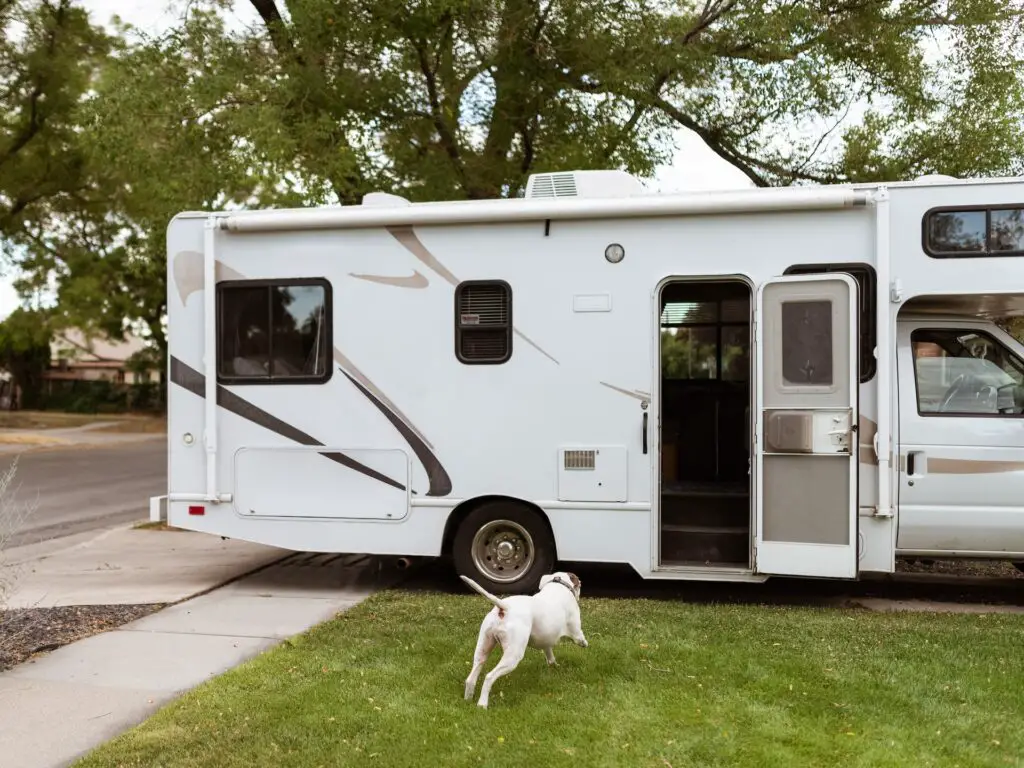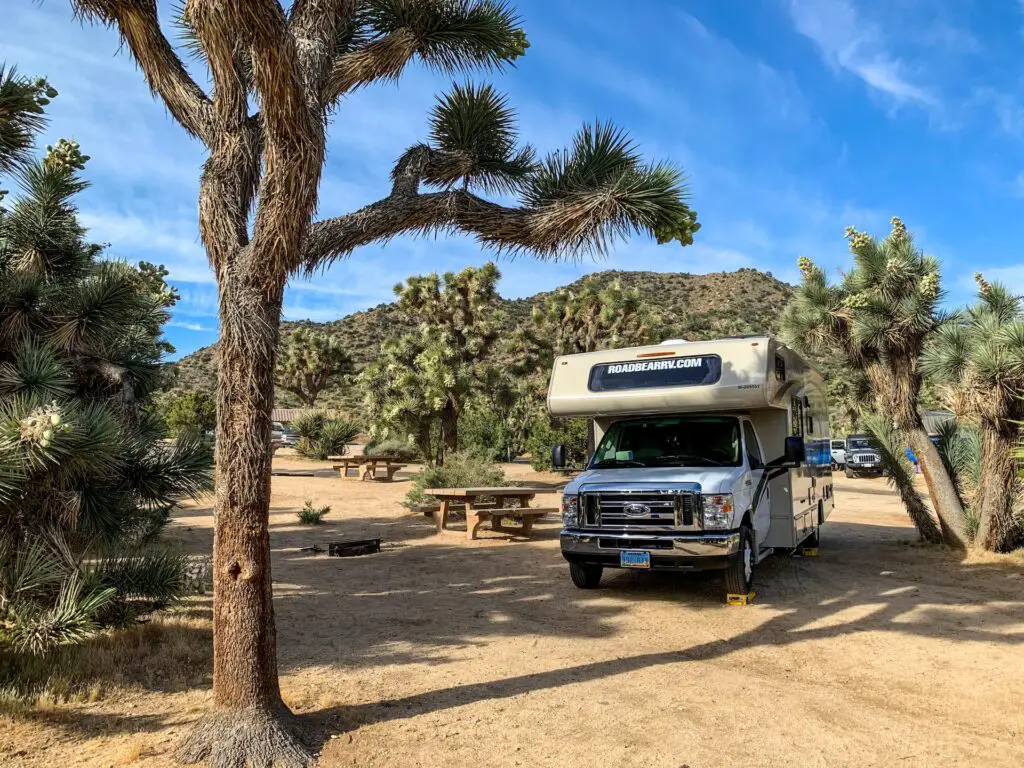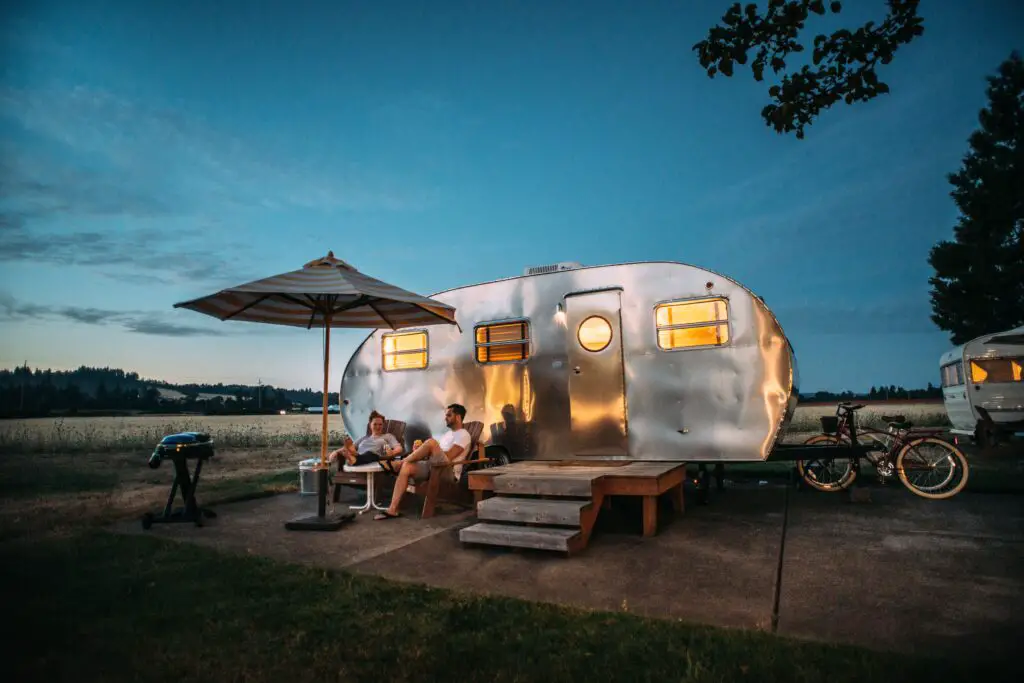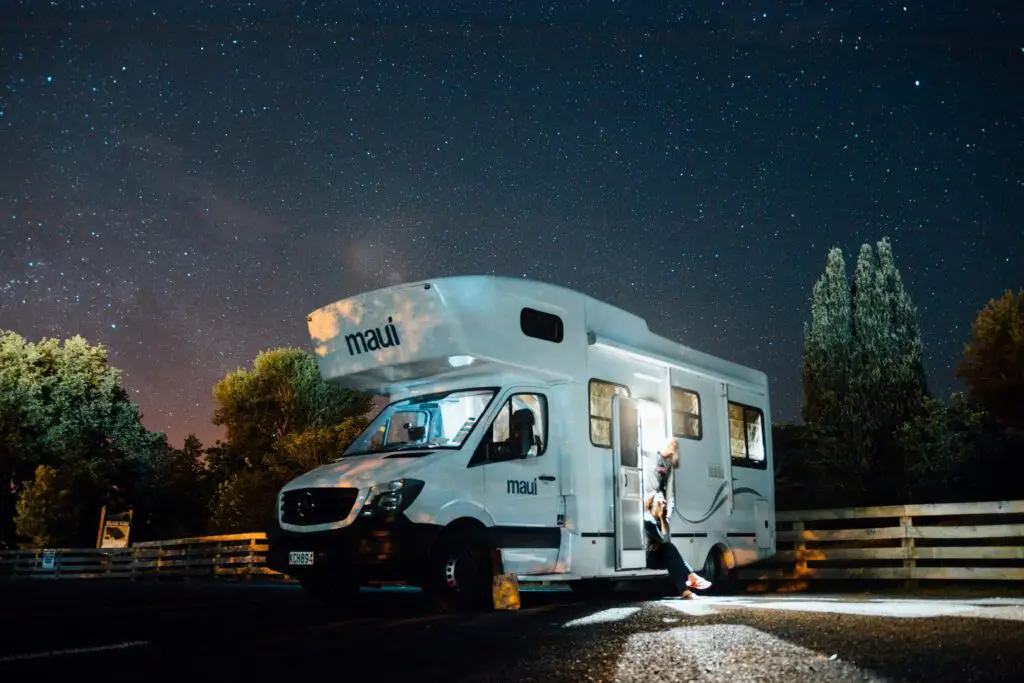Published Date: January 13, 2023
Last Updated on August 10, 2023 by Camper Front
We’re sure you’ve heard it before: RVing is about the freedom to go wherever and whenever you want. But what if the Internet connection isn’t up to snuff? What if you don’t have a data plan with enough high-speed unlimited cellular data?
What if your Wi-Fi hotspot can’t handle all your devices simultaneously? Suppose your kids are playing Fortnite while on the road, and their friends are trying to join in from home. These challenges can make RVing feel more like an obstacle course than an opportunity for adventure.
Luckily for all of us, some solutions will make your “how to get internet in RV” question die down!
So, in this guide, we’ll help you learn how to navigate the world of the internet in an RV!
Table of Contents
What Is RV Wi-Fi?
RV Wi-Fi is a wireless internet connection that allows you to access the internet while on the road.
RV Wi-Fi is like any other Wi-Fi, allowing you to connect your devices to the internet. In most houses, you use a cable modem to connect to the internet. The modem broadcasts a wireless signal picked up by any WiFi-enabled device within range.
There are some differences between RV and regular home Wi-Fi in terms of what’s available, but it’s similar in practice.
Living in an RV, campervan, or motorhome, you won’t have a landline for your router to connect to. And this can make internet access a bit more challenging. Therefore, you will need a suitable, alternative solution to enjoy internet access while moving.
What Internet Challenges Do RVers Face on the Road?

If you live in an RV and want to enjoy the full freedom and flexibility of the open road, internet connectivity is not a luxury – it’s a necessity. But trying to stay connected can be frustrating when there are no good Wi-Fi options at your campsite or along your route.
Recognizing the importance of always having internet access, we’ve compiled some of the biggest challenges RVers face regarding internet-related issues!
• Inconsistent Cellular Reception
It’s crucial for anyone who relies on the internet to have decent cellular reception. However, RV travel is different from stationary living.
It’s difficult to get a reliable signal when moving from place to place and using an RV as your home base. So you need to do yourself a favor and ensure you have the right cellular connectivity solutions befitting your lifestyle.
Many camping or visiting areas have limited cell phone coverage. For this, we recommend contacting your carrier and purchasing an international plan that includes roaming. Most carriers have maps that show the areas they cover in their coverage area. So check those out before you travel.
• High-Speed Unlimited Cellular Data Plan
Finding a high-speed internet plan is a challenge for RVers. For many, the cell phone has become an essential tool for staying in touch with family and friends while on the road.
However, most cellular internet carriers do not offer limited data plans to their RV customers. Instead, they offer limited data plans that provide a certain amount of bandwidth per month.
You may be charged extra fees if you exceed this amount of bandwidth during the month. They will suspend your service until the next billing cycle begins.
So, before you plan your RV trip, search for the most suitable high GB, high-speed cellular data plan.
• Confusing Array of Hardware Options
Over the last decade, our technology landscape has evolved dramatically. From MiFis to Jetpacks, routers to boosters, and more, there’s one thing for sure: wireless connectivity has taken over and changed how all of us must utilize the web.
Therefore, as an RVer who wants to be connected to the internet, it’s important to research various gadgets and systems.
However, all the different devices, apps, and services can be daunting to navigate—especially if you’re new to RVing or don’t have much experience with technology. And if you’re trying to figure out how these things work while also managing your RV and everything else that comes with traveling? That’s a lot for anyone to take on!
But don’t worry! We’ve got you covered with this handy guide that will help you connect your RV to the internet.
How Can Internet Access Boost Your Traveling Perks?
Sometimes the best trip is in the comfort of home. And although most of our lives are spent working and running errands, we all deserve a break at some point.
One of the best ways to get away from it all is to go camping. But not everyone wants to head out into the wilderness with just a tent or other simple set-up.
Most importantly, you cannot do much without the internet and will probably regret your RV trip anytime soon. Hence, an internet connection becomes a necessity for your RV.
Here are some of the benefits of having a reliable internet connection in your RV:
• Fun and Leisure
There are plenty of reasons why people like to take long road trips in their RVs. One of them is that it gives them time to relax and do things they wouldn’t normally do at home or work.
The internet makes this even easier by giving people access to fun websites and apps that make traveling more enjoyable.
With an internet connection in your RV, you can watch everything from Netflix originals to live sports events on your mobile device or laptop computer.
Whether you want to play games online or watch movies while taking a break from driving, having an Internet connection will come in handy!
• Convenient Remote Working
Did you know that when most people think of RVing, they think of camping or traveling? They picture the great outdoors and relaxing with friends and family in a quiet place away from everyday life.
What they don’t picture is working remotely from their RV! But for many people, this is an essential part of their RV lifestyle.
You can work from anywhere in the world if you have an internet connection. You can continue to work just as if you were at the office; check emails, make video calls, or manage your project. The only difference is that beautiful views instead of cubicles surround you!
• Easy Online Schooling
If your children attend school online, they can continue their studies by accessing their lesson plans via a laptop or tablet. This way, online schooling becomes easier while traveling with the family.
Besides, they’ll be able to complete assignments at any time during the day or evening while enjoying time away from home.
• Communication and Safety
The same internet connection that allows you to stream Netflix, use your online banking, and research your next vacation destination also allows you to stay connected with family, friends, and colleagues.
Consistent cellular reception is important because it allows RVers to stay up-to-date on important news about weather conditions and other travel advisories for specific areas they plan on visiting during their trip.
For example, if there’s a storm coming from the west that could affect an area where you’re planning on camping this weekend, having access to that information would allow you to make adjustments.

5 Best Options on How to Get Internet in RV
RV internet access is a big deal. Many people who go camping or traveling in an RV, motorhome, or camper van have come to rely on the internet to stay connected with family and friends and keep up with work.
But what if your RV doesn’t have Wi-Fi? Or what if you’re out of range of the nearest Wi-Fi hotspot? What then?
Fortunately, there are many options for getting online while you’re away from home, even if your RV doesn’t have its own Wi-Fi access point. Here are five of our favorites:
1. Satellite RV Internet Access
Satellite Internet allows you to use your laptop or smartphone when camping. You attach a satellite dish to your RV, and you’re good to go once it’s installed.
This option allows you to connect to the Internet wherever you are. Satellite Internet is basically a wireless system that transmits signals from satellites orbiting the Earth to your RV.
Once in place, satellite Internet allows you to connect from anywhere in the continental US at speeds comparable to DSL or cable service. Most systems offer quick set-up and installation.
However, the price of this service can be high, so it is important to consider whether these costs are worth the benefit.
Most RVers use satellite systems for TV needs. But those who want to stay connected on the road will also need a satellite for their data needs.
If that’s the only goal you have, just purchase the satellite system you need for data usage. Then consider adding a TV when you get everything up and working.
A couple of major providers offer satellite internet to RV travelers. The most popular are Viasat (formerly WildBlue) and HughesNet.
When looking at satellite Internet service providers, you need to buy the equipment that provides Internet access to your motorhome or trailer. It includes a satellite dish, which is pretty expensive depending on your preferred antenna type.
You can lease this equipment for a monthly fee or pay for it outright. The vehicle-mounted antenna is usually purchased separately from the router, modem, and cable. Also, consider the options for moving this system between RV sites and different vehicles when necessary.
2. Wi-Fi RV Internet Access
The days of camping and not being able to check Facebook, Instagram, or Twitter from your campsite may be over.
Wi-Fi has been gaining popularity in campgrounds and parks lately. Many campgrounds now offer Wi-Fi hotspots allowing travelers to connect their phones and other devices to the free Internet at a reasonable speed.
It’s always a good idea to call the campground or park office before you book to verify that Wi-Fi is available where your RV is located.
Pick a place where you’ll have access to the Internet and start enjoying your time there. The better campgrounds will also have Wi-Fi access throughout the campsite.
While many parks and campgrounds provide free Wi-Fi access, others charge a small amount. Ask the RV park if they have an internet fee before you set up a campsite.
Before purchasing a data package, consider if you will be accessing the internet on your phone or through your laptop. Also, consider what you plan to do with the internet and if the available packages suit your needs.
If you plan to use your Wi-Fi to stream Netflix, watch YouTube, and other forms of entertainment, make sure that they’ll be able to handle it. Some RV parks have data caps, and if you go over that limit, they can charge an additional fee or even suspend your account.
So, campground Wi-Fi service may suffice if you simply want to relax by the water while working or checking your email. However, many people do need something other than this option because of poor internet services in most campgrounds.
3. Cellular (Wireless) RV Internet Access
Are you an Internet addict and require constant access to your favorite sites? If so, then cellular (wireless) RV Internet access is for you. This connectivity allows for great flexibility regarding location and device choices, such as a laptop, tablet, or even smartphone.
While cellular (wireless) RV Internet access is not a perfect solution, it allows you to connect to the Internet in most places at reasonable speeds. With a data-capable phone or mobile hotspot device, you can do basic online activities such as e-mail, banking, and web browsing while driving – most of this while your partner drives.
Cellular data may be perfect for traveling, but you must choose your plan carefully. Wireless providers like AT&T Mobile, Verizon, etc., have different coverage and prices. So it’s important to ensure you select the best provider for your destination and needs.
4. Internet Wi-Fi Through a Smart TV
Smart TVs are computers with built-in operating systems (like Windows or Android) that offer capabilities comparable to a laptop. These TVs have an internet connection and access to streaming apps such as Netflix, Hulu, and Amazon Video.
These TVs offer numerous other features and connectivity options, including wireless mobile internet via Wi-Fi or Bluetooth. They also have multiple HDMI ports connecting external devices like gaming consoles or Blu-ray players and built-in web browsers.
Depending on your TV’s brand and age, you can access the existing WiFi signal and wireless cable internet router using its modem.
However, the downside to this option is that it is hard to navigate when you want to send an e-mail or online banking.
5. Cable and DSL
Cable and DSL connections are common internet access at stationary residences. If you live in an RV full-time, you probably don’t want this connection.
However, if you’re simply using your remote home for weekend getaways or other short-term stays, this could be a great way to stay connected wherever you park.
Tips for Fast RV Wi-Fi Signal
Planning ahead is the best way to ensure a strong RV Wi-Fi signal. Here are some tips for making sure you have an excellent internet signal:
• Move the RV
If you’re having trouble getting a fast RV Wi-Fi signal, the best thing to do is move the RV. If you’re at a campground with many trees around, try moving to an open space with fewer obstacles to your signal.
• Buy a Booster
You can find them at most electronics stores or online. Boosters work by amplifying your existing Wi-Fi signal and making it easier to pick up, so even if you’re in a spot where there isn’t much signal available, this will help!
• Don’t Depend on One Network Provider
Research cell phone plans before you plan your trip. So you know what kind of coverage will be available, where you’re going and when.
If possible, get multiple plans from different providers. This way, if one network isn’t working well for you, another option will still be available when things go south.
• Get the Right Antenna for Your Vehicle
If you’re moving around a lot, you should get an omnidirectional antenna that can pick up signals from all directions.
If you’re staying in one place for a while, you should invest in a directional antenna that can hone in on signals coming from a specific direction.
However, note that multi-directional antennas are weaker than directional antennas.

Frequently Asked Questions
1. Is public Wi-Fi really good?
Public Wi-Fi for RV is a great way to stay connected while on the road. But it’s not without its challenges.
First, there’s the speed. Public Wi-Fi is slow, and often there are limits on how much data you can use before it stops working. The slow speed and limits mean that it might fail to work well if you’re downloading a movie or trying to stream live video.
The second challenge with public Wi-Fi is security. When you connect to a public network, there’s always a risk that someone else might be using it too. They could be using your connection to download viruses or steal information from other users. The solution? Use a VPN service so no one can see what you’re doing online.
Finally, some public networks have terrible coverage. It is hard to get a good signal and use your phone or tablet. Also, if you’re trying to get in touch with someone who lives far away from where you are now, it might be harder than usual!
Hence, you will face difficulty getting work done, especially if you’re on a deadline or trying to connect with clients.
2. How can you choose a cellular carrier for wireless internet?
Choosing a cellular carrier for wireless internet is important, but it’s easier than you think. You first need to consider the coverage of cellular carriers in the area where you planned your trip.
Besides, here are some other things to consider:
How much data do you use? If you’re a light user, you can get away with a cheaper plan that offers less data. But if you download movies and play online games, you probably want to ensure your carrier has enough data for your needs.
Do you need 4G service? Some carriers only offer 3G service, which can mean slower speeds and more trouble streaming video or playing games. If this matters to you, look for carriers that offer 4G service.
How much does the carrier charge for roaming fees? If you travel frequently and don’t want to avoid paying extra fees for using your phone outside of its home area, this should also be something to consider when choosing a carrier.
3. Is the quality of cellular Wi-Fi gear important?
Yes, the cellular gear quality for your RV’s Wi-Fi network is important.
If you’re traveling in a motorhome or campervan, you likely have a lot of stuff that needs to stay connected: your phone and laptop, maybe even a tablet or two.
The more devices you have, the more likely someone will use them at once. Everyone will fight over it if there’s only one cellular connection in your RV until someone gets disconnected. That’s no fun for anyone!
The solution? Get yourself some good cellular gear for a Wi-Fi network in your RV. The kind of gear we’re talking about here can help strengthen and secure the signal, like routers, RV-specific Internet gear, etc. So everyone can use their device without worrying about losing their connection.
4. What is a roof-mounted RV satellite dish?
A roof-mounted RV satellite dish is a device that allows you to receive TV signals from satellites, even when you’re not in an area where cable or other sources are available.
The dish itself is mounted on your RV’s roof and works by picking up signals from satellites orbiting Earth. These signals are then sent down to a receiver inside your RV.
The receiver converts them into video and audio signals, which can be viewed or listened to through a television or stereo system, respectively.
It automatically finds the right spot to pick up signals, so you don’t have to be an expert in tracking satellites.
A roof-mounted satellite dish is great if you want to watch TV or use the internet while traveling. But they can be expensive: some models cost thousands of dollars.
5. What is a tripod-mounted satellite dish?
A tripod-mounted RV satellite dish is a satellite antenna that you can use to receive TV signals and internet access on your RV. It’s often mounted on a tripod so it can be raised, lowered, and angled easily.
This type of dish comes in two varieties: fixed and motorized. Fixed dishes have a base that is permanently fixed to the ground and are static in their positioning. Motorized dishes can move up and down as needed.
Although it offers more flexibility than roof mounted satellite dish, you need enough room to store it. Besides, it does not work automatically and is more cost efficient than the roof mounted version.
6. What do you need to use cable internet via a wireless modem?
You can use cable internet via a wireless modem if you have a wireless router or access point. You can also use your laptop’s built-in wireless adapter. But this is only recommended for short-term use, and it may be less stable than an external wireless adapter.
7. Is it okay to use a wireless HDMI transmitter to connect your laptop to RV’s TV?
Yes, this is absolutely okay! A wireless HDMI transmitter is a great way to connect your laptop to RV’s TV. The transmitter will send the signal from your laptop to the TV.
It doesn’t matter whether you’re using a laptop or a desktop computer as long as it has an HDMI port and can connect wirelessly to the wireless HDMI transmitter.
However, note that an HDMI transmitter is more costly than an HDMI cable. And once you connect your laptop to RV’s TV, it causes the laptop’s fan to run nonstop, leading to heating issues.
Conclusion
When you’re on the road in your RV, reliable internet access is a must.
You want to be able to stream your favorite shows, check your email, and stay connected with friends and family back home. But having a reliable connection can be hard when you’re in an RV or camper van. That’s why we created this guide to help you find the best internet solution.
When it comes to internet connectivity, RVers have many more choices than they do with mobile phone service. You can choose from satellite, Wi-Fi, and wireless hotspot options depending on your location.
However, all these choices can be confusing and lead to unnecessary spending if you’re not careful. Therefore, we have mentioned some of the best ways to get internet access in your RV.
We recommend you use a mix-and-match solution of these options so that you will not be stranded if anything goes wrong!

